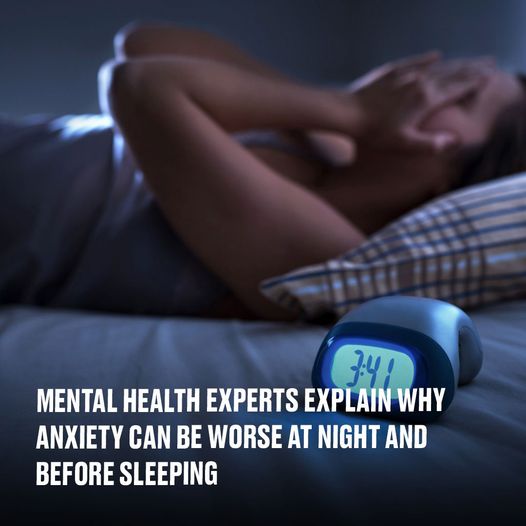For millions of people, the quiet moments before sleep can be the hardest. As anxiety creeps in, it often becomes more intense during the night. But why is this so common? Mental health experts have explained several reasons why anxiety can worsen just before you sleep, shedding light on how nighttime conditions may heighten feelings of unease.1
Lack of Daytime Distractions

During the day, the brain is often occupied with tasks, work, or social activities, which can help keep anxious thoughts at bay. As behavioral psychologist Professor Ivo Vlaev explains, “Anxiety tends to worsen at night… because of the change in environment and mental focus.” When night falls, distractions fade away, and the mind is free to reflect on worries and unresolved issues. Without the daily distractions, small concerns can become magnified, leading to rumination. Vlaev points out that nighttime reflection can often transform into overthinking, which intensifies anxiety – just in time for sleep.
Read More: More and More Evidence Is Showing That Alzheimer’s Disease is Linked to Gut Health
The Role of Physical Fatigue

By the time night rolls around, mental and physical fatigue can significantly weaken your emotional regulation. Exhaustion makes it harder to manage stress, leading to increased anxiety levels. According to Vlaev, “Fatigue impairs emotional regulation, and by the end of the day, coping mechanisms are often weaker”. As people struggle to wind down, they may find themselves less equipped to handle anxious thoughts, which can spiral into full-blown worry.
Hormonal Fluctuations and Cortisol

Hormones also play a crucial role in why anxiety tends to spike before sleep. Cortisol, often referred to as the “stress hormone,” has a natural rhythm in the body. Its levels tend to rise in the early morning hours, which is why waking up anxious can be a common issue. However, elevated cortisol levels at night can also keep the brain alert, making it harder to relax. Clinical psychologist Charissa Chamorro notes that anxiety can cause elevated adrenaline and cortisol levels, which might disrupt sleep. For people with chronic stress or anxiety disorders, these hormones don’t follow their natural cycle, exacerbating nighttime anxiety.2
Fear of the Dark and Lack of Control

Another reason anxiety may feel worse at night is the environment itself. Darkness, quietness, and isolation can create feelings of unease. A study in the International Journal of Psychophysiology found that people, even those without anxiety disorders, have heightened fear responses to stimuli at night. Vlaev explains, “Nighttime brings about a feeling of loss of control… the sense of waiting for sleep and not knowing when it will come can make people feel helpless, exacerbating anxiety”. When you combine this with the physical darkness and quiet of the night, it’s no wonder anxiety becomes amplified.
A Vicious Cycle of Anxiety and Sleep Deprivation

The fear of not being able to sleep often becomes a self-fulfilling prophecy. As Chamorro explains, anxiety and sleep deprivation can create a vicious cycle. “Several nights of high anxiety and disrupted sleep may lead to negative expectations about sleep, which can further hurt sleep,” she said. In other words, worrying about sleep can cause even more sleepless nights. Daytime choices, like consuming caffeine or spending time on electronic devices, may also worsen nighttime anxiety by disrupting sleep hormones. It’s important to make conscious decisions that set you up for a more restful night.
Understanding and Managing Nighttime Anxiety

While nighttime anxiety can feel overwhelming, understanding the underlying causes—such as the lack of distractions, fatigue, hormonal imbalances, and environmental triggers—can help manage it better. Simple adjustments like cutting out caffeine or using relaxation techniques may also reduce the intensity of nighttime worries. As Professor Vlaev points out, “Anxiety thrives in the absence of distractions.” Creating a routine that soothes both the mind and body may provide the necessary tools to combat late-night anxiety and help you sleep better.
